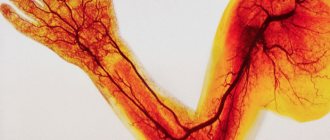Signs of the disease
This disease has no obvious symptoms; these are mainly the consequences of stress or serious diseases of the pelvic organs. First of all, the patient experiences a frequent urge to urinate, but there is a feeling of emptiness in the bladder. In its advanced form, pain when urinating may be added to the symptoms. Women often mistake this symptom for a manifestation of cystitis.
People suffering from bladder neurosis are often shy and embarrassed about their problem. Many tolerate and remain silent. Neurosis is not a physical disorder and must be treated not only with medication, but also with psychotherapy.
Tips for treating bladder neurosis
Few patients can boast of the ability to urinate in public places. Therefore, you need to ask your close friends or relatives for help. Take them to a crowded place, such as a club. Let him stay with you while you try to urinate in the toilet. Over time, this will build self-confidence.
Don't use diapers, it just makes things worse. It will seem to you that you are not like other people, and that they are just as uncomfortable. Psychological and physical discomfort causes tension in the nervous system, which leads to an exacerbation of the disease.
Bladder problems occur at any age in both children and adults. They cause a lot of trouble because you have to constantly go to the toilet. This is especially unpleasant if a person does not have the opportunity to constantly visit the restroom. In children, this problem can cause complexes and mental disorders. Finding out why this happens is sometimes not so easy, because frequent urination is observed not only due to physiological reasons, but also due to neurosis.
Causes
Spinal cord injuries in the lumbar region contribute to pelvic floor nervousness. This area contains the excretory organs of the digestive system, including the bladder.
There are several reasons why this disease develops:
- After accidents or fights, people experience involuntary urination. This occurs more often in men or children.
- Progressive diseases, nephropathy or multiple sclerosis of the nervous system.
- Alcoholism and diabetes. Women are more prone to this.
- A child may develop bladder neurosis due to strong feelings of fear. Constant stress due to a dysfunctional family, problems with peers and adaptation in society.
Features of cystalgia in women
The nervous system and dysfunction in it are the main reason for the development of cystalgia. As a rule, the disease is observed in very vulnerable and overly emotional women. One of the factors in the manifestation of the disease includes sexual overtones. Bladder neurosis is often recorded in women who are inclined to perceive sexual intercourse as a violent process. Masochistic tendencies and frigidity also provoke the development of the disease. Sexual problems contribute to blood stagnation in the pelvis, and this provokes mental exhaustion. As a result, this disease is called psychosomatic cystitis. Cystalgia in women is a common disease that should not be ignored.
Therapy
Once the doctor has identified the cause of the neurosis, treatment can begin. Sedatives will help eliminate the effects of illness after stress. Antibiotics and antiseptics will help get rid of the disease caused by spinal injury.
You need peace and no irritating factors nearby. During treatment, it is better to take a vacation and go somewhere where there will be no people. It is recommended to undergo treatment with a psychiatrist, who can prescribe the following medications:
- Rexetine. White coated tablets. This drug belongs to the group of antidepressants. Helps relieve stress and psychosis. It has anxiolytic and psychostimulating effects. Contraindicated for pregnant and lactating women.
- Phenibut (aminophenylbutyric acid). Tablets are white, round, flat-cylindrical. It is also sold in powder form. Dispensed without a doctor's prescription. Improves the functioning of the brain and nervous system, normalizes sleep. Phenibut improves performance and attention. Do not use if you have a stomach ulcer.
Neurosis of the intestines, stomach (gastrointestinal tract): symptoms, treatment – Harmony within
Let's talk about a disease that is difficult to diagnose and self-diagnosis - gastric neurosis, or gastroneurosis. It is difficult to distinguish it from ordinary diseases of the digestive system, however, the principle of treating gastric neurosis has a fundamental difference - cure is possible only through correction of the psychological state.
What it is?
Stomach neurosis is a psychosomatic disease that occurs against the background of neurasthenic, hysterical or psychasthenic neuroses. Refers to autonomic neuroses. Includes symptoms that are usually mistaken for signs of gastrointestinal diseases. However, it differs from somatic diseases in the presence of concomitant nervous disorders.
It is quite difficult to distinguish gastric neurosis from diseases caused by organic causes. A comprehensive examination is required, including gastroenterological and psychological diagnostics.
Symptoms of gastric neurosis
They are divided into two groups - at the level of body and soul. Physiological symptoms include the classic list:
- nausea and vomiting immediately after eating;
- chest pain;
- frequent loose stools;
- flatulence;
- heartburn;
- lack of appetite;
- hunger that occurs soon after eating;
- belching;
- pain in the intestines (colic);
- constipation;
- feeling of fullness in the intestines;
- rumbling;
- constant feeling of a “full stomach”;
- pain radiating to other parts of the body;
- aversion to food.
Psychologists say that in the case of three or more symptoms in a patient, most likely gastric neurosis; the symptoms and treatment in this case are different from ordinary diseases of the gastrointestinal tract, since psychological and vegetative manifestations will be present:
- poor sleep – insomnia, frequent awakenings at night;
- general anxiety and restlessness;
- fixation, obsessive states;
- hypochondria (a meticulous search for illnesses and confidence in one’s ill health);
- irritability, causeless aggression;
- headache and dizziness;
- weakness;
- unstable blood pressure;
- tachycardia;
- frequent urination;
- pain and heaviness behind the sternum;
- migraine.
The difficulty of diagnosis lies in the fact that psychological manifestations can be present for a long time, and only after months and years does intestinal neurosis appear - the symptoms are difficult to connect together, so the patient can treat gastrointestinal diseases for a long time and unsuccessfully, without knowing about the psychological causes of his condition.
Types of gastric neurosis
Several of the most common types of gastroneurosis can be distinguished based on the predominant symptom.
- Neurosis with severe heartburn, which cannot be relieved with medications. Heartburn exhausts the patient and reduces the quality of life, but examination does not reveal any organic disorders or pathologies.
- Anorexic form - aversion to food, inability to eat even previously favorite dishes. This form of neurosis is very dangerous, since if prolonged, it can lead to general weakness, emaciation and even death from exhaustion.
- Bulimic form. A person experiences severe hunger and eats with increased appetite, but immediately after eating he throws up what he has eaten. Vomiting can occur involuntarily or be caused intentionally. It is impossible to cure such a neurosis of the stomach on your own; treatment should begin as soon as possible and only by specialists!
- Aerophagic disorder is characterized by swallowing air, belching and flatulence.
- Neurosis with low stomach acidity. In this case, food is poorly digested, the person feels a weak appetite, experiences pain, and constipation.
- Intestinal neurosis with frequent loose stools that occur for no reason, pain (irritable bowel syndrome).
Intestinal neurosis
It is a branch of gastroneurosis, although it is rarely isolated as a separate disease. Most often, neurosis of the stomach and intestines manifests itself in the patient simultaneously. The symptoms are listed above: stool disorders, flatulence, pain in the soft part of the abdomen, a feeling of fullness in the abdomen.
Usually, disturbances in the functioning of the stomach and intestines due to nervousness accompany each other, but in some cases intestinal neurosis occurs without gastric symptoms.
We are not talking about intestinal neurosis if the symptoms appear episodically and in connection with isolated stressful situations. Almost every person has experienced indigestion at least once before an exam, a date, or speaking in public.
But such “nervous” diarrhea and stomach turmoil do not require treatment and go away on their own. Now imagine a similar condition that does not go away for months.
Regardless of what worries the patient—an upset stomach due to nervousness or intestinal neurosis—the treatment is the same: symptom relief plus psychotherapy.
Causes of gastroneurosis
The main cause of gastroneurosis is a violation of the nervous regulation of the gastrointestinal tract.
In a broader sense, this condition is caused by stress in which a person remains for longer than he can bear. Stress becomes chronic, the body is constantly “preparing for battle”, the adrenal glands secrete the stress hormone – cortisol.
The psyche, like a hundred thousand years ago, reacts to stress with the desire to fight or flee, but a person living in the civilized world is forced to block these desires. The vagus nerve is overstimulated by cortisol and adrenaline.
Since it is responsible for the secretion of the stomach, the production of gastric juice decreases or increases, food is poorly digested, or, conversely, the acidic environment causes the development of stomach ulcers. Similar processes occur with the intestines, which react to stress with frequent loose stools or constipation.
A protracted difficult situation with work, money, personal and professional relationships can lead to neurosis.
Chronic stress is often caused by the loss of a loved one or a painful breakup. Prolonged overwork, poor nutrition and regular lack of sleep also lead the body to a state of stress.
Also, intestinal neurosis often manifests itself against the background of an existing chronic neurosis. Thus, the saying “All diseases come from nerves” is confirmed.
A person can literally be “sick of life”; it is difficult for him to “digest” it.
Neurosis of the intestines and stomach, constipation and heartburn with VSD - how to treat
If you suffer from constant nausea or even vomiting, you are tormented by heartburn and heaviness in the stomach, and treatment does not bear any fruit, it is possible that you have a food neurosis or, as I call it differently, intestinal neurosis. This problem is the result of abnormalities in the nervous regulation of this organ and, as a rule, it affects middle-aged people whose nervous system is subject to high stress.
Before moving on to considering treatment methods for this disease and its symptoms, it is necessary to find out what contributes to its occurrence and how it develops.
With gastric neurosis, unpleasant sensations manifest themselves in a slightly different way than with gastroenterological diseases.
For example, a patient may, having barely risen from the dinner table, complain that he feels a feeling of emptiness in his stomach or, conversely, a feeling of fullness even after the most modest meal.
For some reason, treatment with well-proven drugs also does not produce results.
The matter is further complicated by the fact that many patients do not consider this problem serious enough, thinking that everything will go away on its own.
Alternatively, they begin to treat the disease on their own, using actively advertised (but far from safe) enzyme preparations and painkillers.
In such cases, we can say with almost one hundred percent certainty that the problem is of a psychological and not a gastroenterological nature.
It may seem that the digestive and nervous systems have nothing in common, however, both are closely related. Moreover, all processes, reactions, as well as sensations that occur, including in the abdominal cavity, are controlled and provided by the nervous system. Therefore, any failure will certainly affect the overall health, including the digestive system.
To be convinced of the correctness of the above, it is enough to recall various difficult life situations when even healthy people begin to experience heartburn, nausea, a lump in the throat, etc.
Prevention
There are some recommendations from doctors for the prevention of neurosis:
- Reduce fluid intake to a minimum (1.5 liters of water is the daily norm for an adult). This will help reduce symptoms.
- For young people, a set of gymnastic exercises may be prescribed to strengthen the walls of the bladder. In addition to strengthening the bladder, the pelvic muscles are strengthened.
- Adults with neurosis need to eat foods high in fiber. Coffee irritates the bladder and invigorates the nervous system, so you will have to give it up.
Complications and consequences
Bladder neurosis disrupts work in all areas of a person’s life. There is a decrease in performance, frequent stress, and increased irritability when communicating with other people. Psychogenic delay can lead to rupture of the bladder or kidney organs, as a result of which experts recommend that at the first symptom of cystalgia, seek advice and prescribe effective therapy. Possible complications include:
- swelling of the genitals;
- chronic inflammatory processes;
- prolapse of the vaginal walls.
Psychotherapeutic intervention
Psychotherapy methods are needed to establish the cause of the development of neurosis. It also replaces negative perceptions with positive ones if a person is scared or depressed. The approach to each patient is selected individually.
Psychosomatics is one of the effective methods of treating neurosis. This technique is suitable for those who do not have physical disabilities. More often for children who were very frightened.
You should not treat bladder neurosis in your child on your own. This condition requires professional intervention. Do not aggravate the situation, do not yell at the child or punish him. It is important to ensure a calm environment in the family and the social well-being of the child.
Neurosis of the stomach and intestines: signs of pathology and treatment
Intestinal neurosis (synonymous with irritable bowel syndrome) is a disease that is characterized by a combination of pain with stool disorders and dyspeptic symptoms (rumbling, flatulence, forced urge to defecate). The duration of the pathology is more than three months.
The disease is diagnosed in 50-70% of people who first turned to a gastroenterologist with complaints from the gastrointestinal tract. Intestinal neurosis is detected at different ages, including in children. Women are susceptible to irritable bowel syndrome 4 times more often than men.
Symptoms
With intestinal neurosis, symptoms can vary significantly. This disease is characterized by a chronic course with periods of exacerbations and remissions.
The most common complaints when visiting a gastroenterologist are:
The pain syndrome can vary in intensity: from mild discomfort to severe cramping pain. Triggered by food intake. The release of gas or bowel movements helps the pain subside.
Associated symptoms include:
- feeling of incomplete bowel movement;
- feeling of a lump in the throat when swallowing;
- migraine-like headaches;
- urination disorders (frequent urge to urinate, feeling of a full bladder, feeling of incomplete emptying of the bladder, etc.);
- heartburn, belching;
- pain in the lumbar region.
Intestinal neurosis is characterized by a number of features:
- Long history of the disease.
- Variable nature of symptoms.
- A clear connection between psycho-emotional factors and intestinal symptoms.
- No symptoms during sleep at night.
Types of pathology
Depending on which symptom predominates, the following forms of the disease are distinguished:
- Functional diarrhea. The clinical picture is dominated by symptoms of diarrhea, which can occur up to 4 times a day. The stool is light in color and often contains undigested food. Diarrhea occurs mainly in the morning. Abnormal bowel movements are accompanied by an imperative (violent) urge to defecate (tenesmus). Abdominal pain does not occur with this form.
- Functional constipation. Clinical manifestations of constipation have several variations. In one case, the absence of stool is replaced by constipative diarrhea (profuse excretion of feces), then constipation occurs again. In other cases, the stool is regular, but is accompanied by a feeling of incomplete bowel movement after defecation, or the stool itself resembles sheep feces or has a ribbon-like shape. This form of the disease is accompanied by a pronounced psycho-emotional coloring (a painful state, a feeling of internal tension).
- Painful form. The pain is cramping in nature, often appears in the left lower abdomen, and intensifies before defecation. After bowel movement the pain disappears. Eating can trigger pain. A person is bothered by a feeling of heaviness in the stomach, bloating. Flatulence intensifies in the evening. A feature of intestinal neurosis is the absence of abdominal pain at night.
Diagnostic signs
Diagnostic criteria include recurrent abdominal pain or discomfort on at least 3 days per month over the past 3 months, accompanied by the following:
- health improves after defecation;
- delay or increased frequency of bowel movements provokes the onset of pain;
- the onset of pain is associated with a change in stool consistency.
Abdominal pain must be accompanied by at least two signs:
- bowel movements less than three times a week or more than three times a day;
- the stool is hard or bean-shaped (sheep feces) or loose, watery in nature;
- prolonged straining during defecation;
- secretion of mucus in feces during bowel movements;
- feeling of bloating, fullness in the abdomen, or incomplete bowel movements after bowel movements.
Laboratory and instrumental studies
To make a diagnosis and exclude tumors, inflammatory processes, acute intestinal infections, a mandatory diagnostic minimum is carried out:
- Complete blood count with leukocyte formula. The analysis shows changes in the blood during inflammatory processes and anemic conditions.
- Blood chemistry. The analysis shows the functioning of internal organs (liver, pancreas), identifies markers of inflammatory processes and metabolic disorders.
- Coprogram (stool microscopy). Detects disturbances in the process of digestion of dietary fiber (fiber, muscle fiber).
- Fecal occult blood test. The analysis shows the presence of intestinal bleeding (see also the rapid test from the pharmacy for occult blood in the stool).
- Sigmoidoscopy. The method allows, under visual control, to examine the mucous walls of the rectum and sigmoid colon and determine organic pathology.
- Colonoscopy. Using this method, it is possible to examine the entire large intestine and take biopsy material to clarify the diagnosis.
- Culture of stool on the intestinal group. The method is prescribed to confirm or exclude acute intestinal infection (dysentery, salmonellosis).
Treatment
Treatment of intestinal neurosis is complex and includes several areas:
Diet
With the help of food, it is possible to correct a number of clinical manifestations.
For constipation, foods containing substances that are not broken down in the gastrointestinal tract by enzymes and are excreted unchanged are prescribed (see ballast substances).
In the intestines, these substances bind with water and swell, filling the intestinal lumen. In response to filling, intestinal motility increases and intestinal emptying improves. These products include:
- wholemeal black bread;
- vegetables (especially cabbage, zucchini);
- fruits (pear, apple);
- bran.
The disadvantage of such a diet is the high frequency of provoked pain and flatulence in the abdomen.
Psychotherapy
A person remains dissatisfied when, during examination, they do not find an organic pathology that would explain the existing symptoms. In these cases, it is necessary to conduct explanatory conversations about the causes of irritable bowel syndrome and its consequences.
Drug treatment
Medicines are prescribed based on the dominant symptom (pain, diarrhea or constipation).
- Drugs that improve intestinal motility (cisapride, lactulose). Used for intestinal neurosis with a predominance of stool retention in the clinic.
- Antidiarrheal drugs (loperamide). Prescribed for intestinal neurosis accompanied by diarrhea.
- Antispasmodics (no-shpa, buscopan). Used to combat pain.
- Simethicone and dimethicone are used to treat flatulence.
- Antidepressants (Atarax, Grandaxin). With intestinal neurosis, hidden depression or increased anxiety are often detected.
- Prokinetics (Motilium), enzymes (Creon) are prescribed as auxiliary treatment.
Prevention
- balanced diet containing proteins, fats and carbohydrates;
- adherence to diet;
- timely diagnosis and treatment of inflammatory processes in the intestines;
- timely detection of hidden anxiety and depressive diseases;
- adequate physical activity during the day;
- rejection of bad habits.
Source: https://ProKishechnik.info/zabolevaniya/nevroz-kishechnika.html
Why does neurosis occur?
The sympathetic and parasympathetic parts of the nervous system are responsible for the functioning of the urinary tract.
The first forces the fibers to contract, preventing urine from escaping. Another section is responsible for relaxing the muscles that hold the sphincters. Its activity can provoke contraction of the inner walls of the bladder. This helps urine pass smoothly through the ureteral canal.
This condition is not considered a disease, but a psychological disorder. It is caused by stress, severe fears, and various emotions of a vivid nature. From strong excitement, the nervous system is overloaded, any of its departments can become very excited. This is how one of the types of neurosis develops.










